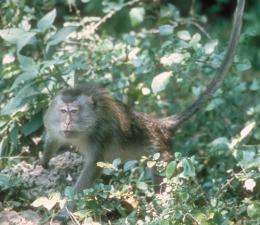March 31, 2011 report
Monkeys have better basic counting skills than originally thought

(PhysOrg.com) -- In a recent study published in Nature Communications, it appears that Old World monkeys have the ability to count better than was originally thought. The research also shows that when presented with counting tasks, these long-tailed macaques are very similar to children in suppressing their impulses.
Researchers, led by Vanessa Schmidt from the German Primate Center in Goettingen, Germany, conducted basic numeracy tests on long-tailed macaques in an effort to show that these primates understand the concept of relative quantity.
In the first experiment, researchers presented the monkeys with two plates of raisins with one having more than the other. The idea being that the monkeys would choose the plate with the larger number of raisins. In this first experiment, the monkeys were then allowed to eat the raisins on the plate they choose. In this experiment, researchers found that the monkeys had a tendency to get this wrong and chose the plate with the smaller amount of raisins.
In the second experiment, the researchers decided to replace the raisins with non-edible objects, in this case pebbles. When presented these plates with pebbles, the monkeys did much better.
The third experiment returned to the plates with raisins, but instead of being rewarded with the raisins on the plate, the monkeys were rewarded with raisins hidden underneath. This experiment showed the same results as the pebbles.
Researchers point out that these natural impulses in the monkeys and their desire to eat the raisins interfered with their judgment in the initial experiment. Similar to young children and the reverse reward paradigm, these monkeys were not able to see past their desire to eat the raisins.
In the reverse reward paradigm, young children are presented with two piles of candies of different sizes. The children will always point to the larger pile and then this pile is given to another child. Children have difficulty understanding that by choosing the smaller pile, they will receive the larger pile. However, if this test is repeated with non-edible objects, the children are able to understand and perform the experiment correctly.
Researchers in this study point to the same interference in judgment by the monkeys when presented with food. Their desire to eat the food gets in the way of the task at hand. These researchers believe that previous studies performed on other primates using food as a test symbol may have impaired results and therefore underestimated the primate’s numeracy abilities.
More information: Representational format determines numerical competence in monkeys, Nature Communications 2, Article number: 257 doi:10.1038/ncomms1262 , Published 29 March 2011
© 2010 PhysOrg.com














